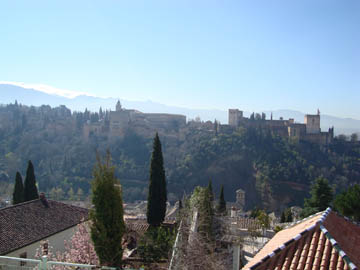Menu
DECOLONIALISM
|
The conceptual framework within which I have organized my academic research has been decolonialism, which in my opinion is necessarily trandisciplinary.
TRANSDISCIPLINARITY Without deconstructing modern science ad nihilum, transdisciplinarity allows the academic to approach reality from a variety of epistemic angles. Modern academic disciplines can thus contribute to the pursuit of knowledge alongside other intellectual tools like art, literature or spiritual intuition. Check out the Charter of Transdisciplinarity for a clear idea of what is involved here. DECOLONIALISM Here is a quick overview of decolonialism taken from my Master’s thesis: Decolonialism is an intellectual current critical of modernity as a Western-centric colonial world-system. It is represented by authors such as Enrique Dussel (1-3) and Ramón Grosfoguel (4-8). For them, modernity began in 1492 with the defeat of Granada and the initial European expansion into America. At that time, Europe was beginning to become the centre of a world order. Decolonial theorists see modernity as the fruit of the dialectic between the colonial Western centre and its global peripheries—a dialectic in which progressive liberalization and emancipation at the centre is somewhat proportionate to coercion on the periphery. The decolonial project seeks to transcend postcolonialism and postmodernism. Indeeed, both these intellectual currents are rooted in Western theoretical models. They are Eurocentric critiques of Eurocentrism (7). In contrast, decolonialism proposes a ‘transmodern’ utopia in which the West is decentred without being destroyed or replaced by a new hegemon (1-3, 7). Of course, it should be recognized that over time the West has become more than the western extremity of Eurasia. Today, it is also what could be called an epistemic space. As inheritors of the modern colonial epistemology born in Western Europe, Westerners need not be of European ancestry. They can be found on every continent. Likewise, many people living in Western Europe and North America represent peripheral perspectives, and can actually be considered colonial subjects (4, 7). Academically, decolonialism entails producing knowledge from peripheral epistemologies rather than about them (6, 7). This is precisely my intention. As an academic and a member of the Burhaniya, I have attempted to produce pertinent knowledge from the Sufi worldview of the Burhaniya, rather than about it. I should add, to be perfectly clear, that for me decolonialism is not primarily a political project, but an ontic and epistemic one with political implications among others. In fact, since the end of most colonial administrations in the twentieth century, it has become increasingly clear that coloniality can survive colonialism. Terminology is crucial here. Whereas colonialism is an administrative system of foreign occupation, coloniality is a hegemonic system that supports total domination of subaltern peripheries by a colonial centre (7). From these peripheries, what has come to be known as ‘globalization’ appears as a process incorporating all peoples into a system centered on Western power. This system is totalitarian in that it encompasses all aspects of human existence, including politics, economy, education, art, language, and of course epistemology. Academic systems of knowledge (i.e. disciplines) centered in Western modernity are deeply colonial (6), having been conceived and developed as part of the Western hegemonic project. Therefore, academic decolonialism requires taking a critical stance towards modern disciplinary configurations, perhaps not to destroy them, but to attempt to radically transcend their limitations. In this regard, transdisciplinarity can be a useful theoretical framework, complementary to decolonialism. 1. Dussel E., Ibarra-Colado E. Globalization, Organization and the Ethics of Liberation. Organization. 2006;13(4):489-508. 2. Dussel E. The Invention of the Americas: Eclipse of "the Other" and the Myth of Modernity. New York: Continuum; 1995. Available from http://biblioteca.clacso.edu.ar/ar/libros/dussel/1492in/1492in.html 3. Dussel E. The Underside of Modernity : Apel, Ricoeur, Rorty, Taylor, and the Philosophy of Liberation. Atlantic Highlands, N.J.: Humanities Press; 1996. Available from http://biblioteca.clacso.edu.ar/ar/libros/dussel/apelin/apelin.html 4. Grosfoguel R. Race and Ethnicity or Racialized Ethnicities?: Identities within Global Coloniality. Ethnicities. 2004;4(3):315-36. 5. Grosfoguel R. Human Rights and Anti-Semitism After Gaza. Human Architecture: Journal of the Sociology of Self-Knowledge. 2009;7:89-101. 6. Grosfoguel R. Epistemic Islamophobia and Colonial Social Sciences. Human Architecture: Journal of the Sociology of Self-Knowledge. 2010;8:29-38. 7. Grosfoguel R. Decolonizing Post-Colonial Studies and Paradigms of Political-Economy: Transmodernity, Decolonial Thinking, and Global Coloniality. TRANSMODERNITY: Journal of Peripheral Cultural Production of the Luso-Hispanic World [Internet]. 2011; 1(1). Available from http://www.escholarship.org/uc/item/21k6t3fq. 8. Grosfoguel R, Mielants E. The Long-Durée Entanglement Between Islamophobia and Racism in the Modern/Colonial Capitalist/Patriarchal World-System. Human Architecture. 2006;5(1):1-12. |
Two decolonial summer schools in Spain: |

